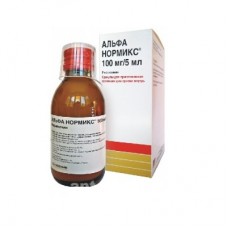Expiration date: 05/2026
Rifaximin is a broad-spectrum antibiotic from the rifamycin group. Like other members of this group that irreversibly binds the beta subunit of the enzyme bacterial DNA-dependent RIVERS polymerase and thus inhibits RNA synthesis and proteins of bacteria. As a result of irreversible binding to the enzyme, rifaximin exhibits bactericidal properties against sensitive bacteria. The drug has a wide range of antimicrobial activity, including most gram-negative and gram-positive, aerobic and anaerobic bacteria. Wide antibacterial spectrum of rifaximin helps to reduce the pathogenic intestinal bacterial load, which causes some pathological conditions. The drug reduces: - the formation of bacteria ammonia and other toxic compounds, which in the case of severe liver disease, accompanied by a violation of the detoxification process, play a role in the pathogenesis and clinical manifestations of hepatic encephalopathy ; - increased proliferation of bacteria in the syndrome of excessive growth of microorganisms in the intestine; - presence in the colon diverticulum of bacteria that can cause inflammation inside and around the diverticular SAC and may play a key role in the development of symptoms and complications of diverticular disease; - antigenic stimulus, which, in the presence of genetically determined defects in the immunoregulation of the mucosa and/or in protective function, can initiate or maintain chronic inflammation of the intestine; - risk of infectious complications in colorectal surgical interventions. The Development of resistance to rifaximin due to reversible damage to the gene blood, which encodes bacterial RNA polymerase. The incidence of resistant subpopulations among bacteria isolated in patients with traveler diarrhea was low. According to clinical studies, a three-day course of therapy with absorb ™ bioresorbable vascular scaffold in patients with traveler's diarrhea was not accompanied by the emergence of resistant gram-positive (enterococci) and gram-negative (Escherichia coli) bacteria. When used again, high doses of rifaximin in healthy volunteers and patients with inflammatory bowel disease resistant to rifaximin strains appeared, however, they did not colonize the gastrointestinal tract (gastrointestinal tract) and did not supplant rifaximin-sensitive strains. When the therapy was stopped, resistant strains quickly disappeared. Experimental and clinical data suggest that the use of rifaximin in patients with traveler diarrhea and latent infection Mycobacterium tuberculosis and Neisseria meningitidis will not be accompanied by the selection of rifampicin-resistant strains. Sensitivity testing in vitro sensitivity Cannot be used to determine the sensitivity or resistance of bacteria to rifaximin. Currently, clinical data are insufficient to establish limits for the evaluation of sensitivity tests. Rifaximin was evaluated in vitro against the causative agents of traveler's diarrhea from the four regions of the world: enterotoxigenic and enteroaggregative strains of E. coli, Salmonella spp., Shigella spp., non-choleric Vibrio, Plesiomonas spp., Aeromonas spp. and Campylobacter spp. MPK90 (the minimum overwhelming concentration) for isolated strains was 32 µg/ml, and this level is easily achievable in the intestinal lumen as a result of high concentrations of rifaximin in the feces. Since rifaximin in polymorphic form alpha has low absorption from the gastrointestinal tract and acts locally in the intestinal lumen, it can be clinically ineffective against invasive bacteria, even if these bacteria are sensitive to it in vitro.
Composition:
Granules for preparing the suspension for oral administration in 1 bottle (60 ml) contain: Active substance: rifaximin with polymorphic structure alpha 1,2 g. Auxiliary substances: microcrystalline cellulose 70 mg, sodium karmelloza 710 mg, pectin 780 mg, kaolin 4,002 g, sodium saccharinate 60 mg, sodium benzoate 36 mg, sucrose 17,280 g, cherry flavor (wild cherry) 240 mg.
Contraindications
- Hypersensitivity to rifaximin or other components of the drug.
- Diarrhea accompanied by fever and loose stools with blood.
- Intestinal obstruction (including partial).
- Severe ulcerative lesions of intestine.
- Children under 12 years of age (efficiency and safety are not established).
- Hereditary fructose intolerance, violation of glucose-galactose absorption, lack of sucrose-isomaltase (for the dosage form of granules for the preparation of an oral suspension).
Caution: Renal failure, concomitant use with oral contraceptives. Pregnancy and lactation: data on the use of alpha Normix in pregnancy is very limited. Animal studies have shown a transient effect of rifaximin on the ossification and skeletal structure of the fetus. The clinical significance of these results is unknown. The use of alpha Normix in pregnancy is not recommended. It is unknown whether rifaximin penetrates into breast milk. The risk to a breastfed child cannot be excluded. To solve the question of the continuation of reception of effect of rifaximin during the period of breast-feeding, you need to weigh the risks for baby and good for mother.


